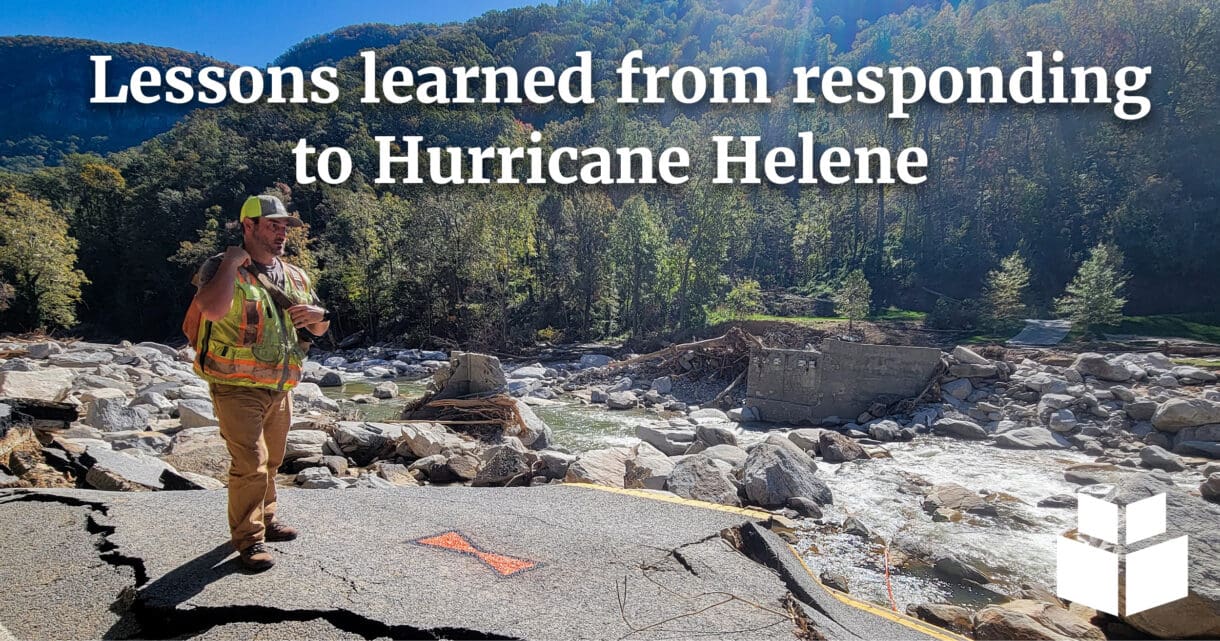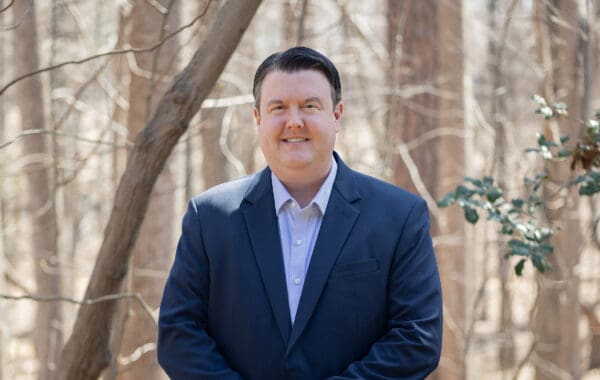
In the immediate aftermath of Hurricane Helene, WithersRavenel mobilized to provide emergency surveying and engineering services. While many of our staff have experience responding to both natural and man-made disasters, the magnitude and extent of the damage challenged them in ways that previous events had not. Because of the patience of our longtime community partners, we learned three important lessons about how private consultants like us can better support local governments after a disaster.
Lesson #1: Local governments need transparency and accountability from consultants responding to emergencies
In a crisis, local government leaders and designated first responders secure public safety in two ways:
- Removing impacted individuals from dangerous situations
- Preventing unqualified individuals from entering dangerous situations
Often the same people need to do both at the same time. Under these conditions, it’s imperative that anyone leading an incident response be able to determine quickly whether a new arrival on the scene is a qualified first responder or an unqualified member of the public.
It’s also helpful to have a way to indicate to incident response leaders when someone has already been authorized to enter a site. This allows the authorized person to leave and return as needed, rather than taking time and attention away from responders to verify them again upon each re-entry.
Before Hurricane Helene, WithersRavenel did not provide standardized physical identification cards to employees; a combination of other methods was sufficient for our day-to-day operations. But while responding to the disaster, our staff soon realized that they did not have an easy way of proving that they were both a) the person they claimed to be, and b) a WithersRavenel employee. This not only put a greater burden on the incident response leaders, but also revealed how a bad actor might wreak havoc by pretending to work for us.
Our Response
WithersRavenel implemented a badging system for our emergency response and field staff. We also partnered with North Carolina Emergency Management’s (NCEM) Business Emergency Operations Center (BEOC) to become a registered vendor. WithersRavenel received authorized vendor re-entry passes from NCEM so that local governments could verify we were authorized private consultants and expedite our movement between restricted areas. This combination of documents provided peace of mind to incident response leaders that individuals seeking access to dangerous sites had been properly vetted.
Lesson #2: Communities need immediate resolutions to utility disruptions, even if they’re only temporary
In the National Response Framework, the U.S. Department of Homeland Security identifies seven community lifelines for incident stabilization:
- Safety and Security
- Food, Water, Shelter
- Health and Medical
- Energy (Power & Fuel)
- Communications
- Transportation
- Hazardous Material
Community lifelines enable communities to function at the most basic level. When they are disrupted, other activities are also disrupted or cease entirely, and human health, safety, and/or economic security are placed at risk.
Community lifelines are also interdependent. For example, a power outage can stop a fuel provider from dispensing fuel, and a lack of fuel can in turn render backup electrical generators useless. Meanwhile, treatment facilities rely on the delivery of potentially hazardous substances to make our water and wastewater safe, and without them, untreated water and sewage themselves become hazardous to the public.
Because of the importance and interdependence of community lifelines, it is often not possible to fix or even focus on one thing before moving on to the next. Instead, disaster response teams must target disruptions with the greatest impact and provide interim solutions that will enable further disaster response and recovery work. This often means prioritizing the systems that disaster response teams are using, such as emergency communication networks, but it’s important not to discount services to “ordinary” citizens, because they are also water and sewer system operators, bus drivers, power and telecom line workers, and volunteers for distributing food, water, and shelter.
Our Response
In the immediate aftermath of Hurricane Helene, WithersRavenel deployed field personnel to several locations to assist with critical tasks. In the Town of Spruce Pine, our Utilities team delivered a “treatment plant in a box” emergency design that helped get the local public school and jail operational again.
Lesson #3: State governments can become overwhelmed by the need to be liaisons, but consultants can ease that burden
During a regional or national incident like a natural disaster, state governments act as connectors between federal and local government agencies and citizens. This responsibility can easily swamp state resources, which may already be limited under the best of circumstances. Communication falters, people become frustrated, and different groups may start acting without coordination, leading to both redundant efforts and overlooked issues.
States don’t have to manage everything alone. A well-informed consultant can take on the role of clearing house between the state and other consultants or subject matter experts. When state representatives only have to relay information to or take questions from one point of contact instead of dozens, they can focus on performing other important disaster response tasks.
Our Response
David Gale, a former Emergency Management Supervisor with the NCEM and a current WithersRavenel Client Experience Manager, initiated a partnership with NCEM’s Business Emergency Operations Center. We attended state-hosted coordination calls with industry and private sector partners to understand what businesses impacted by Hurricane Helene needed to resume operations and what the state could provide in terms of relief or assistance. In turn, WithersRavenel was able to provide situational awareness to our disaster response teams prior to traveling to disaster zones in western NC so that they were prepared to be self-sufficient during their response activities.
Final Thoughts
Private consultants cannot replace public servants at the local, state, and federal level. But armed with these lessons, along with knowledge of the Incident Command System, professional service firms like WithersRavenel can provide invaluable assistance and compassionate partnership during some of the most difficult moments a community may ever face.

